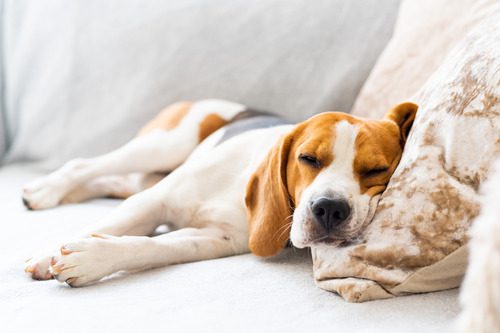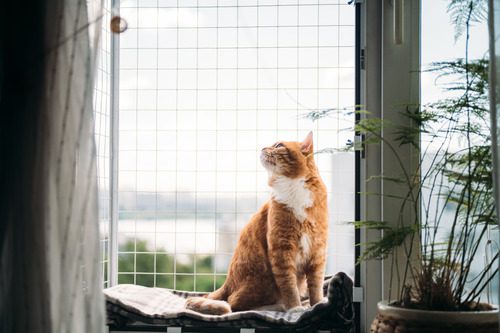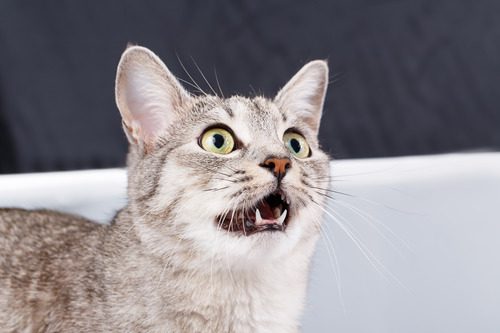Can a Dog Have Sleep Apnea?
Sleep apnea is a condition commonly associated with humans, but can a dog have sleep apnea? While it is rare, sleep apnea can occur in dogs and may indicate an underlying health issue. If your dog frequently snores loudly, experiences interrupted breathing during sleep, or appears excessively tired during the day, sleep apnea could be a concern. Dogs, like humans, rely on uninterrupted sleep for their overall health. Sleep apnea disrupts breathing patterns, reducing oxygen intake and causing fragmented sleep. If you suspect your dog may have sleep apnea, contacting Cornerstone Veterinary Hospital of Saratoga Springs at (518) 691-3300 for an evaluation is the best way to address the issue.

What Causes Sleep Apnea in Dogs?
While sleep apnea is uncommon in dogs, certain factors can contribute to its development.
Obesity
Excess weight is one of the primary risk factors for sleep apnea in dogs. Overweight dogs may accumulate fat around the neck and throat, which can obstruct the airway during sleep. This can lead to difficulty breathing and frequent waking at night. If your dog is overweight, your veterinarian can provide guidance on proper diet and exercise to help reduce the risk of sleep apnea.
Brachycephalic Breeds
Certain dog breeds with short, flattened skulls, known as brachycephalic breeds, are more prone to breathing issues, including sleep apnea. Breeds such as Bulldogs, Pugs, Boston Terriers, and Boxers often have narrowed airways and elongated soft palates that can obstruct airflow. If you have a brachycephalic dog, it is important to monitor their breathing patterns and consult your veterinarian if you notice signs of sleep apnea.
Allergies and Respiratory Infections
Allergies and respiratory infections can cause inflammation and congestion in a dog’s airways, making it difficult for them to breathe properly while sleeping. Seasonal allergies, exposure to environmental irritants, or infections such as kennel cough may contribute to breathing difficulties. If your dog has recurring respiratory issues, your veterinarian can help determine the cause and recommend appropriate treatment.
Recognizing the Signs of Sleep Apnea in Dogs
Can a dog have sleep apnea without obvious symptoms? In some cases, signs may be subtle, making it crucial for pet owners to be observant of any changes in their dog’s sleeping patterns and behavior. The most common signs of sleep apnea in dogs include:
- Loud and excessive snoring – While occasional snoring is normal, persistent and extremely loud snoring may indicate airway obstruction.
- Pauses in breathing – If your dog stops breathing for short periods during sleep, followed by gasping or choking sounds, this could be a sign of sleep apnea.
- Restlessness during sleep – Dogs with sleep apnea often toss and turn due to frequent breathing interruptions.
- Daytime fatigue and lethargy – Interrupted sleep can lead to excessive tiredness, lack of energy, and reluctance to engage in physical activities.
- Irritability or behavioral changes – Poor sleep quality can affect a dog’s mood, making them more irritable or anxious.
If you notice any of these symptoms, a veterinary consultation is essential to rule out serious underlying conditions. Call (518) 691-3300 to schedule an evaluation at Cornerstone Veterinary Hospital of Saratoga Springs.
How Sleep Apnea in Dogs Is Diagnosed
Diagnosing sleep apnea in dogs involves a thorough examination and an assessment of their medical history. Your veterinarian uses various diagnostic tools to determine the cause of sleep disturbances and breathing difficulties.
Physical Examination and Medical History
Your veterinarian will begin by conducting a comprehensive physical examination, evaluating your dog’s airway, weight, and overall health. They will also ask about your dog’s sleeping habits, snoring frequency, and any observed breathing irregularities.
Imaging and Diagnostic Tests
To get a clearer view of potential airway obstructions, your vet may recommend imaging tests such as X-rays. These tests help identify abnormalities in the airway, such as elongated soft palates or masses that could be contributing to breathing difficulties.
Sleep Study
In some cases, a sleep study may be performed to monitor your dog’s breathing patterns and oxygen levels while they sleep. This can provide valuable insights into the severity of sleep apnea and guide treatment recommendations.
Can Dogs with Sleep Apnea Be Treated?
Can a dog have sleep apnea and still live a healthy life? With proper management and veterinary care, dogs with sleep apnea can improve their sleep quality and overall well-being.
Weight Management
For overweight dogs, weight loss is often the most effective way to reduce airway obstruction. Your veterinarian can develop a tailored diet and exercise plan to help your dog achieve a healthy weight.
Surgical Interventions
In brachycephalic breeds, surgical correction may be necessary to improve airflow. Procedures such as soft palate resection or nostril widening can alleviate breathing difficulties and reduce the risk of sleep apnea.
Allergy and Infection Management
If allergies or infections are contributing to airway inflammation, your veterinarian may prescribe antihistamines, decongestants, or antibiotics to address the issue. Keeping your dog’s environment free of allergens can also help prevent breathing difficulties.
Lifestyle and Environmental Adjustments
Creating a comfortable sleeping environment for your dog can help reduce the severity of sleep apnea. Elevating their head while sleeping, using a humidifier, and avoiding exposure to smoke or strong scents may improve breathing during sleep.
Signs It’s Time to Seek Veterinary Care
If you suspect your dog may have sleep apnea, it is crucial to seek professional veterinary care as soon as possible. Left untreated, sleep apnea can lead to chronic fatigue, cardiovascular issues, and decreased quality of life. Your veterinarian can determine the underlying cause and recommend the most effective treatment options. For expert care and guidance, contact Cornerstone Veterinary Hospital of Saratoga Springs at (518) 691-3300 to schedule an appointment online. A thorough evaluation can help your dog breathe easier and sleep more soundly.
Recent Posts
Cornerstone Veterinary Hospital Expands to Saratoga Springs, Bringing Gold Standard Pet Care to More Local Families
In a time when independent veterinary practices are becoming rarer, you deserve a team that puts your…
Cat High Rise Syndrome: What It Is & Treatment Options
Cat High Rise Syndrome: What It Is & Treatment Options Cats are known for their agility, balance,…
Why is My Male Cat Peeing Everywhere and Meowing So Much?
Why is My Male Cat Peeing Everywhere and Meowing So Much? If your male cat is suddenly…
About Us
Originally opened as Animal Care Hospital by Dr. Mark Johnston in 1989, the hospital became Cornerstone Veterinary Hospital in 2015 when it was purchased by Drs. Alan and Lisa Knott. The name 'Cornerstone' holds a special place in their hearts, representing not only their Christian faith but also their commitment to being the cornerstone of the community in which they practice. As a family-owned and operated practice, every pet is treated as part of the family, ensuring they receive the highest standard of care. The team at Cornerstone Veterinary Hospital is dedicated to building lasting relationships with clients and their beloved pets, striving to be the cornerstone of the community in which they practice.



